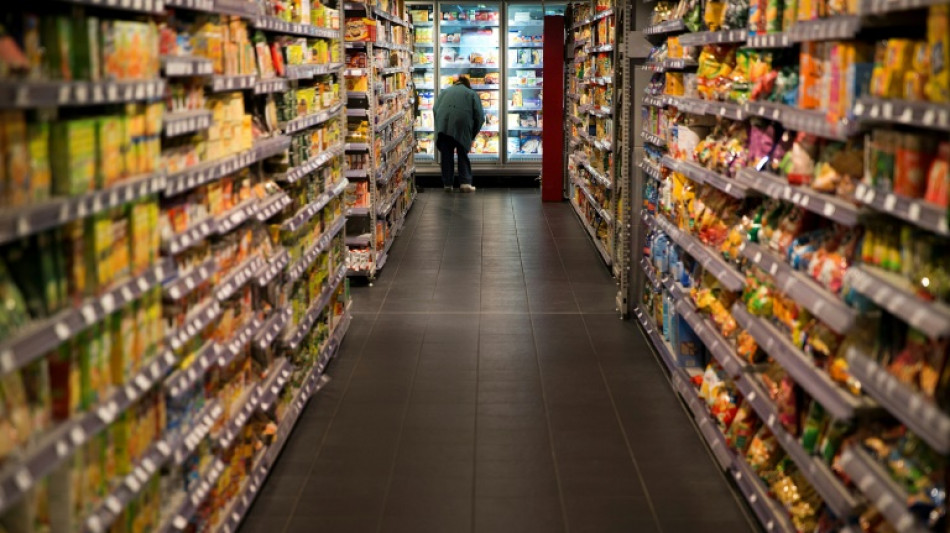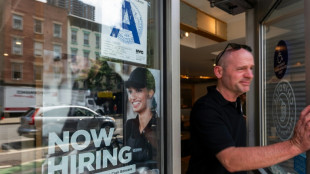
-
 Spain's exiled king recounts history, scandals in wistful memoir
Spain's exiled king recounts history, scandals in wistful memoir
-
Wall Street stocks steady after positive jobs data

-
 Trump blasts Democrats as government shutdown becomes longest ever
Trump blasts Democrats as government shutdown becomes longest ever
-
Indian pilgrims find 'warm welcome' in Pakistan despite tensions

-
 Inter and AC Milan complete purchase of San Siro
Inter and AC Milan complete purchase of San Siro
-
Swedish authorities inspect worksite conditions at steel startup Stegra

-
 Keys withdraws from WTA Finals with illness
Keys withdraws from WTA Finals with illness
-
Prince Harry says proud to be British despite new life in US

-
 EU strikes last-ditch deal on climate targets as COP30 looms
EU strikes last-ditch deal on climate targets as COP30 looms
-
Stocks retreat as tech bubble fears grow

-
 Shein opens first permanent store amid heavy police presence
Shein opens first permanent store amid heavy police presence
-
West Indies edge New Zealand despite Santner brilliance

-
 French pair released by Iran await return home
French pair released by Iran await return home
-
German factory orders up but outlook still muted

-
 Death toll tops 100 as Philippines digs out after typhoon
Death toll tops 100 as Philippines digs out after typhoon
-
Attack on key city in Sudan's Kordofan region kills 40: UN

-
 'No one could stop it': Sudanese describe mass rapes while fleeing El-Fasher
'No one could stop it': Sudanese describe mass rapes while fleeing El-Fasher
-
Champagne and cheers across New York as Mamdani soars to victory

-
 Medieval tower collapse adds to Italy's workplace toll
Medieval tower collapse adds to Italy's workplace toll
-
BMW boosts profitability despite China, tariff woes

-
 South Africa's Wiese wary of 'hurt' France before re-match
South Africa's Wiese wary of 'hurt' France before re-match
-
Beyond limits: Croatian freediver's breathtaking record

-
 Tottenham supporting Udogie after alleged gun threat in London
Tottenham supporting Udogie after alleged gun threat in London
-
Thunder roll Clippers to stay unbeaten as SGA keeps streak alive

-
 In appeal, Australian mushroom murderer alleges 'miscarriage of justice'
In appeal, Australian mushroom murderer alleges 'miscarriage of justice'
-
Toyota hikes profit forecasts 'despite US tariffs'

-
 Ex-France lock Willemse challenges Meafou to become 'the bully'
Ex-France lock Willemse challenges Meafou to become 'the bully'
-
Ukrainians to honour sporting dead by building country they 'died for': minister

-
 At least 7 dead after UPS cargo plane crashes near Louisville airport
At least 7 dead after UPS cargo plane crashes near Louisville airport
-
US Supreme Court hears challenge to Trump tariff powers

-
 US government shutdown becomes longest in history
US government shutdown becomes longest in history
-
India's Modi readies bellwether poll in poorest state

-
 Green goals versus growth needs: India's climate scorecard
Green goals versus growth needs: India's climate scorecard
-
Where things stand on China-US trade after Trump and Xi talk

-
 Sri Lanka targets big fish in anti-corruption push
Sri Lanka targets big fish in anti-corruption push
-
NY elects leftist mayor on big election night for Democrats

-
 Injured Jordie Barrett to miss rest of All Blacks tour
Injured Jordie Barrett to miss rest of All Blacks tour
-
Asian markets tumble as tech bubble fears grow

-
 Pay to protect: Brazil pitches new forest fund at COP30
Pay to protect: Brazil pitches new forest fund at COP30
-
Iraq's social media mercenaries dying for Russia

-
 Young leftist Trump foe elected New York mayor
Young leftist Trump foe elected New York mayor
-
Concerns at ILO over expected appointment of close Trump advisor

-
 Venus Williams to return to Auckland Classic at the age of 45
Venus Williams to return to Auckland Classic at the age of 45
-
No deal yet on EU climate targets as COP30 looms

-
 Typhoon death toll climbs to 66 in the Philippines
Typhoon death toll climbs to 66 in the Philippines
-
NATO tests war preparedness on eastern flank facing Russia

-
 Uncapped opener Weatherald in Australia squad for first Ashes Test
Uncapped opener Weatherald in Australia squad for first Ashes Test
-
Liverpool down Real Madrid in Champions League, Bayern edge PSG

-
 Van Dijk tells Liverpool to keep calm and follow Arsenal's lead
Van Dijk tells Liverpool to keep calm and follow Arsenal's lead
-
PSG left to sweat on injuries to Dembele and Hakimi


How unhealthy are ultra-processed foods?
Ultra-processed foods are commonly portrayed as a modern health scourge: a threat lurking on the shelves of every supermarket linked to obesity, heart disease, cancer and early death.
Researchers warning of their dangers have called for taxation and even bans of products which make up a huge proportion of the food eaten worldwide.
However some nutrition experts have started to push back against such all-encompassing claims, saying the definition can be vague. They say more research is needed and that some ultra-processed foods, or UPFs, can actually be healthy.
The concept was first introduced in 2009 by Carlos Monteiro, a nutrition and health researcher at Brazil's University of Sao Paulo.
His NOVA classification system for UPFs was unusual in nutrition because it ignored the level of nutrients such as fat, salt, sugar and carbohydrates in food.
Instead, it splits food into four groups, ranked by the level of processing involved in their creation. Everything in the fourth group is considered ultra-processed.
Monteiro said that UPFs "aren't exactly foods".
"They're formulations of substances derived from foods," he told AFP.
"They contain little or no whole foods and are typically enhanced with colourings, flavourings, emulsifiers, and other cosmetic additives to make them palatable."
Examples include crisps, ice cream, soft drinks and frozen pizza. But items not traditionally considered junk food are also included, such as non-dairy milks, baby formula and supermarket bread.
According to the NOVA scale, nearly 60 percent of the calories eaten in the United States and UK are from UPFs.
- 'Confused' -
In recent years, dozens of studies have found that people who eat lots of UPFs have a higher risk of heart disease, cancer, asthma, depression and other illnesses.
But these studies have almost entirely been observational, which means they cannot show that UPFs directly cause these health problems.
Monteiro pointed to a US-based randomised-controlled trial, which is considered the gold standard of research.
For the 2019 trial, 20 people were fed either ultra-processed or unprocessed food for two weeks, then the opposite for the following two weeks.
The diets were matched for things like fat, sugar and overall calories. Those eating UPFs gained an average of nearly a kilo (2.2 pounds), while those on the unprocessed diet lost the same amount.
However, there was no limit on how much the trial participants ate, including snacks. Those on the UPF diet ate much more food, and their weight gain roughly matched how many more calories they consumed, the researchers said.
Monteiro said the study showed how big companies make food "hyperpalatable" in a way that "leads to overconsumption and even poses risks of addiction".
But one of the study's co-authors, Ciaran Forde of Wageningen University in the Netherlands, rejected the idea that there is something unique about UPFs that makes them irresistible.
Forde, a critic of NOVA who has disclosed he worked for food giant Nestle nearly a decade ago, said it was not just the public who was "confused".
In a French study published last year nearly 160 nutrition experts were asked to put 231 different foods into the four NOVA categories -- they only unanimously agreed about four.
- A healthy UPF diet? -
This potential for confusion was why US researchers brought in NOVA experts to help them develop a healthy diet in which 91 percent of calories were from UPFs.
Their week-long menu scored 86/100 on the US Healthy Eating Index -- far higher than the average American diet of 59/100.
Julie Hess, a nutritionist at the US Department of Agriculture who led the study, told AFP they sought out fruits and vegetables such as dried blueberries or canned beans deemed ultra-processed because of additives like preservatives.
"There may really be something here, but right now the scale puts gummy candies and sodas in the same category as oranges and raisins," she said.
Both Hess and Forde pointed out that many people do not have the time or money to cook every meal from fresh ingredients.
"Taxing processed foods in the middle of a cost-of-living crisis will be regressive and is likely to affect the most vulnerable groups," Forde said.
Robin May, the chief scientific adviser at the UK's Food Standards Agency, earlier this year warned against a "knee-jerk reaction" that treats all UPFs the same, "when we clearly know that everything is not the same".
Monteiro dismissed criticism of the NOVA scale.
"Those who profit from the sale of ultra-processed foods naturally dislike the NOVA classification and often sow doubts about its functioning," he said.
He called for ultra-processed foods to be treated like tobacco, praising a recent ban on UPFs in schools in Rio de Janeiro.
So where does this debate leave people who simply want to have a healthy diet?
Hess felt that most people already know what food is good for them: fruits, vegetables, whole grains, some lean protein and low-fat dairy.
Even "some delicious, full-fat cheeses" are allowed sometimes, she added.
T.Germann--VB




